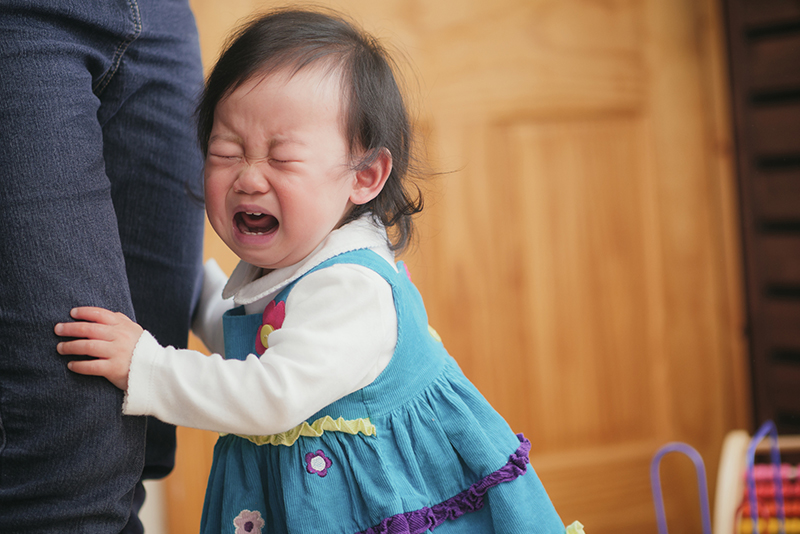Families For Life | Separation Anxiety in Children-Babies

Separation anxiety in children is when children fear being parted from their parents or caregivers. It’s common and normal among babies and toddlers. A few pre-schoolers and school-age children develop a more serious form of the condition, called separation anxiety disorder.
What is separation anxiety in children?
Separation anxiety is the common and normal fear that children have of being away from their parents or caregivers.
Separation anxiety can start at around 9 months and reach its peak in babies aged 14-18 months. It usually goes away gradually throughout early childhood.
Stranger anxiety is similar to separation anxiety. It’s when children get upset around people they don’t know. It can happen from 7-10 months and usually starts to go away after the child’s first birthday.
These anxieties are a normal part of development and are nothing to be concerned about. Children are starting to move around more at this stage, so these anxieties make sense from a survival point of view. That is, if children could crawl or walk away from their caregivers but weren’t afraid of separation or strangers, they’d get lost more easily.
Helping children with separation anxiety
If your child is suffering from separation anxiety, there are lots of things you can do to help her.
In new places
If you’re leaving your child in a new setting – child care centre, pre-school, friend’s house, babysitter – spend time at the new place with your child before the separation. Your child will be less distressed if he’s left in a safe, familiar place with familiar people he trusts.
Let your child take something she loves from home, like a teddy bear, pillow or blanket. These objects will help your child feel safer, and you can gradually phase them out as she feels more settled in the new place.
Tell your child’s child care centre, pre-school or school about his separation anxiety, and let them know about anything you’re doing to help your child. This way, other people in your child’s environment can give him consistent support.
Gently encourage your child to separate from you by giving her practice. It’s important to give her positive experiences of separations and reunions. Avoiding separations from your child can make the problem worse.
When you’re leaving your child
Tell your child when you’re leaving and when you’ll be back. This is helpful even with babies. Sneaking out without saying goodbye can make things worse. Your child might feel confused or upset when he realises you’re not around and might be harder to settle the next time you leave him.
Settle your child in an enjoyable activity before you leave.
Say goodbye to your child briefly – don’t drag it out.
Keep a relaxed and happy look on your face when you’re leaving. If you seem worried or sad, your child might think the place isn’t safe and can get upset too.
At home
No matter how frustrated you feel, avoid criticising or being negative about your child’s difficulty with separation. For example, avoid saying things like ‘She’s such a mummy’s girl’ or ‘Don’t be such a baby’.
Read books or make up stories with your child about separation fears – for example, ‘Once upon a time, there was a little bunny who didn’t want to leave his mummy in the hutch. He was afraid of what he might find outside …’. This might help your child feel he’s not alone in being afraid of separating from his parents.
Make a conscious effort to foster your child’s self-esteem by complimenting her and giving her lots of positive attention.
Separation anxiety disorder in children
As children reach pre-school and school age, they’re less likely to have separation anxiety. Of course, there’ll always be times when they only want to be with you.
If your pre-schooler or school-age child seems particularly and regularly upset about being separated from you, it’s possible he has separation anxiety disorder. About 4% of pre-schoolers and school-age children develop this condition.
Separation anxiety disorder is when:
the anxiety interferes with your child’s life, and therefore with your life
your child has more severe anxiety than other children the same age
your child’s anxiety has gone on for at least four weeks.
If you’re concerned your child might have separation anxiety disorder, look out for times when she:
dislikes being separated from you
worries that you or she might get hurt or have an accident
refuses to go to child care, pre-school or school
refuses to sleep at other people’s places without you
complains about feeling sick when separated.
At around 10 months, most babies get upset if a stranger comes up to them in an unfamiliar room. Only 50% get upset if they have time to get used to the room. This means that in new situations, babies cope better when they come across new things gradually.
Professional help for separation anxiety and separation anxiety disorder
You know your child best. If you’re worried about his anxiety, consider seeking professional help. Here are some places to start:
your child’s General Practitioner (GP) or paediatrician
Government polyclinics and hospitals
your child’s school counsellor
a specialist anxiety clinic
© raisingchildren.net.au, translated and adapted with permission
Explore more